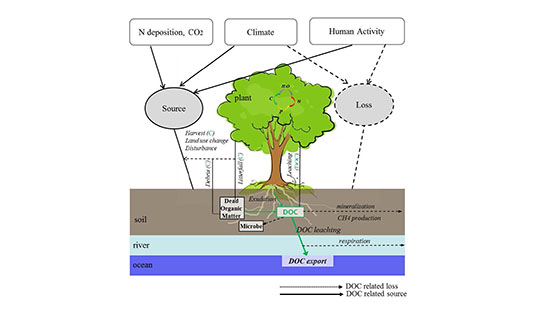Study shows importance of sustainable agriculture in preserving Gulf ecosystem
Study shows importance of sustainable agriculture in preserving Gulf ecosystem

Dissolved organic carbon that enters the ocean through river runoff is a necessary food for aquatic microbes that are vital to water quality and health. However, too much dissolved organic carbon is not a good thing for water quality or for aquatic life.
From 1901 to 2010, the amount of dissolved organic carbon entering the Gulf of Mexico from the Mississippi River increased by 40 percent. A University of Kentucky College of Agriculture, Food and Environment researcher led a study that shows the increase is mainly due to human activity but sustainable agricultural practices are slowing the increase compared to previous ones.
In the study, Wei Ren, assistant professor in the UK Department of Plant and Soil Sciences, and fellow researchers found three-fourths of the increase was due to changes in land use and land cover along the Mississippi River and its tributaries. In the past century, the Mississippi River basin had a large amount of land converted to cropland. Agricultural practices like fertilizer use, irrigation and tillage were included as contributing factors. Most of the increase due to agricultural practices occurred before the 1960s. Since then, only slight increases have occurred. Ren said this is because farmers have implemented more sustainable practices on their farms, which shows the importance of sustainable agricultural practices in coping with future environmental changes.
Environmental factors including increased atmospheric carbon dioxide, nitrogen deposition and climate change also contributed to the increase in dissolved organic carbon.
Researchers found major climate events caused dramatic swings in the magnitude of dissolved organic carbon exported into the ocean between consecutive years. In years of drought, the amount of dissolved organic carbon entering the Gulf of Mexico decreased. In years with a major flooding event, it increased.
“As the climate continues to change, sustainable agricultural practices are going to be vital to limiting the amount of dissolved organic carbon entering the oceans through runoff due to major climate events, such as flooding,” she said.
Additional researchers on the study included scientists from North Carolina State University, Auburn University, University of Delaware, University of Massachusetts Dartmouth, University of Georgia and the National Sun Yat-sen University in Taiwan.
The study was featured on the cover of the September issue of Global Biogeochemical Cycles, an academic journalpublished by the American Geological Union.
To view the issue, visit http://agupubs.onlinelibrary.wiley.com/agu/issue/10.1002/gbc.v30.9/.
Crops Environment Research Sustainability Weather

